Get involved in plant propagation
Plant Propagation (HORT 3300) is a course offered by Tarleton State University, and is taught by Dr. Stuart Weiss, Assistant Professor in Horticultural Science. This course is required for current horticultural students, the new Bachelor of science, B.S., in Horticulture and Plant Sciences (Fall 2022), B.S. in Agricultural Services & Development and satisfies an elective for any Tarleton student. The course is 3 credit hours with a lab at the Animal and Plant Sciences Center at the Tarleton Agricultural Center. Dr. Weiss’ goal for this course is to “increase student awareness and understanding of the varied and critical roles that plant and plant-based systems provide to environmental stability, productive agroecosystems, and human wellness,” Weiss said.
In this course, students are exposed to a variety of horticultural plants. This includes various fruits and vegetables, native plants, and tropical plants that are propagated and grown at the Tarleton field locations as well as the university greenhouse.
As plant propagation is a class that agricultural education majors are required and/or encouraged to take, Dr. Weiss emphasizes the importance of equipping his students with technical knowledge and practical experience needed to propagate and cultivate a variety of plants that provide life-enhancing services. It is his goal “to provide TSU students destined to become future educators of our youth with the skills necessary to teach their own students gardening skills and horticultural practices with an appreciation of plants at an elementary or secondary level, well before they enter college,” Weiss stated.
Dr. Weiss also teaches various other courses including Horticultural Cropping Systems (HORT 4323, formerly Vegetable Production) and Organic Agriculture (WSES 4324). Plant propagation can sound like a complicated term if you are unfamiliar with it, but in simple terms it means “how to propagate plants from seed and vegetative propagation methods,” Weiss said.
During the lab portion of the plant propagation course there is an abundance of hands-on activities. Dr. Weiss explained that his favorite lessons to teach in the lab occur on warm, sunny days in the horticulture vegetable gardens because he “teaches students how to garden and grow their own healthy food,” Weiss explained.
This class is all about sustainability and equipping students with real life skills to become more self-sufficient and improve confidence when growing plants. One particular factor that brought horticulture major, Blair Umholtz, to Tarleton is that plant propagation is “only offered at Tarleton or two other schools in Texas,” and “small class sizes means more time for individual discovery and learning,” Umholtz said.
One assignment at the beginning of this course to help fuel the fire of passion in students is to watch the documentary Kiss the Ground.
“I am an agricultural education major and previously had a focus on agricultural mechanics, but I decided to add a horticulture minor after beginning this class. The interactive growing in the lab and the movie assignment motivated me to want to learn more,” student Zachary Bellomy explained.
For more information about this course or the Horticulture and Plant Sciences program, contact Dr. Stuart Weiss at [email protected].



